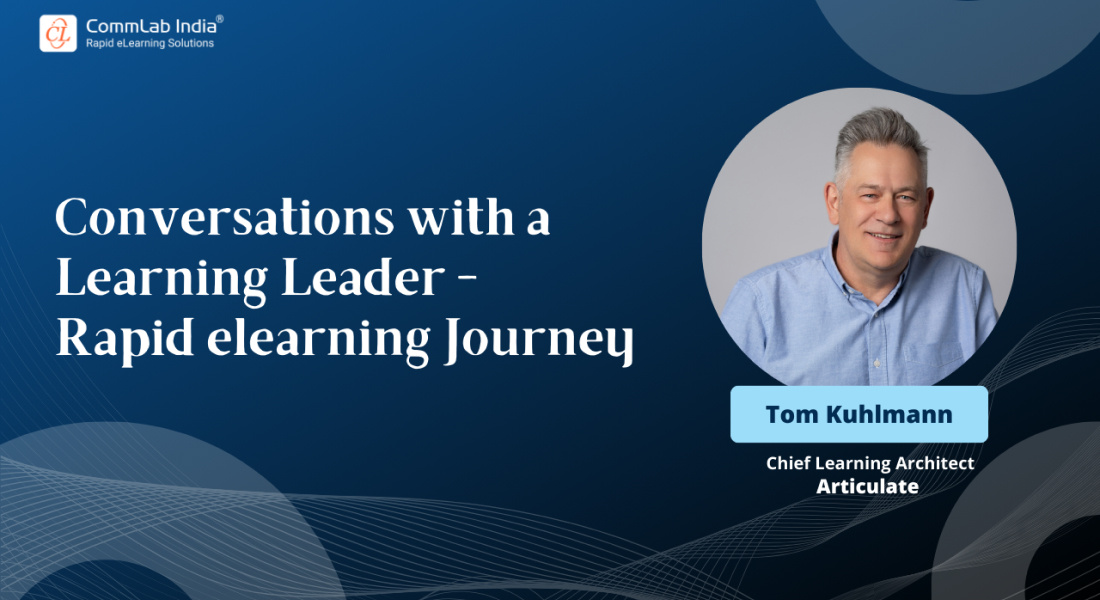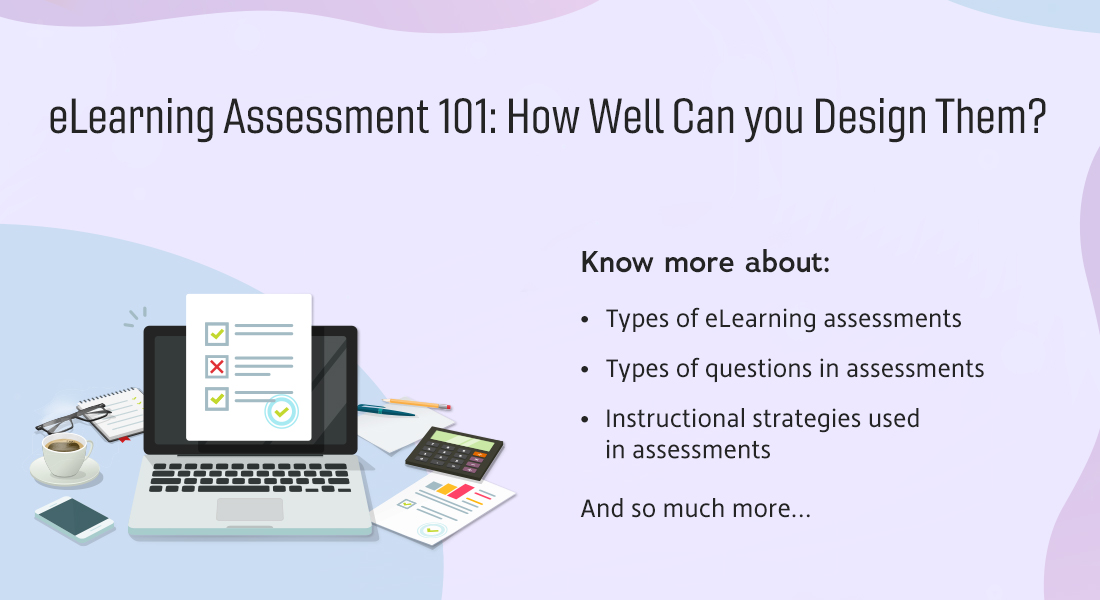CommLab India Interviews Tom Kuhlmann: An Overview of His Rapid eLearning Journey

Welcome to CommLab India’s eLearning Champion podcast featuring an interview with Tom Kuhlman, the Chief Learning Architect at Articulate, a leading provider of eLearning software.
Tom has over 25 years of experience in the training and eLearning industry, having worked with one-man teams to large international corporations. An award-winning expert, Tom shares his insights and tips with over 150,000 readers through his weekly Rapid eLearning Blog.
In this interview, Tom takes us through his journey from wanting to be an MTV music video director to becoming Articulate’s Chief Learning Architect, and gives insights into some important questions on eLearning. Here’s a brief paraphrase of what he said.
The Importance of Aligning Training Goals with Organizational Goals
Aligning training goals with organizational goals is a challenge for most training teams. That’s because of the disconnect between how trainers measure success and how the organization measures success. When we look at aligning goals, the first thing to consider from a training perspective is understanding the type of training you’re building. Is it information or explainer type training? Or is it performance-based training?
If you're in a training space where all you're doing is compliance training, it's difficult to align that with the organization's goals. Health and safety training or sexual harassment training are all good training initiatives, but have little to do with what the organization needs to do from a performance perspective.
Performance-based training is the training that's aligned to what the organization is trying to do. The training team has to be proactive and ensure their training initiatives are aligned with the organization’s goals.
That’s why it's important that training teams get a seat at the table and become performance consultants to the organization. Then they’ll be able to decide where training can make an impact because not every performance issue is a training issue, despite what organizations often think. Then, they’ll be able to help align their training initiatives to the organization’s goals. Performance consulting helps ensure the training initiatives are the right initiatives to help the organization succeed.
Why Training Teams Need to Become Performance Consultants
A lot of training teams are order takers, they sit passively waiting for the organization to spell out their training needs. And that’s tough. One of the challenges with internal training teams is that when the organization realizes there’s a performance gap and employees need training, they approach vendors and not their internal teams to build their training. That’s because vendors have more of a consultative role. So, internal teams need to determine how to get in front of their own organization to demonstrate their skills and be a consultant to what the organization needs. And that's the challenge to internal teams – how do they become consultants to the organization? How do they show their organization that they can add some value?
How to Design Effective L&D eLearning Programs
For information-based courses such as compliance training, the organization’s measurement for success is just, “Did you take it?” OR “Do you have a certificate that you attended this course?” Why build elaborate courses for such content? Extend the least amount of resources to them, which will free up your resources to focus on performance-based courses.
Performance-based courses don't need a lot of content. They are all about changing a person's behavior or performance, or acquiring new skills. What you want them to do is to ‘do the things that they would do on the job’. They need to be put into situations where they start making decisions. Teach them what they need to learn. And then give them as many opportunities to do that as possible. So, in this context, you are providing a real work opportunity. Ask yourself:
- What do they need to do?
- What is it they need to learn?
- What are the scenarios where they would use this information?
- What are the decisions they’d have to make? How do they make those decisions?
- What do they need to do to practice? How many times can they repeat that?
And that’s what makes eLearning work well, because it provides a risk-free environment to fail. You can fail, and it doesn't matter. You get feedback, and you repeat.
Another important factor for effective implementation of training is how the organization works. What usually happens in organizations is that when there’s a need to train employees on something, they send them to a training program where trainers train them. Employees attend classes, pass, and go back to work. The manager has no role in what they had learned and how to apply what they learned. Why is it that the manager isn’t more involved with the employees training and assessment? That’s what needs to be taken care of.
The Evolving L&D Landscape in the Context of Advancing AI Tools and Technologies
In a lot of ways AI seems kind of magical, especially AI image generators. We had stock images before AI came into the picture. But the problem with stock images is that they’re ‘stock images’ and so you won’t get the exact image you need for your course. But AI can give you that specific image. And over time, AI is going to be built into every product, everything we use, it’s going to be ingrained in everything.
There's going to be negatives and positives to AI. We have these information- and performance-based courses. Information-based courses are mostly about content. Because organizations don’t want to build a lot of custom content for those types of courses, AI is going to do all that going forward. Performance-based courses are a bit more challenging. So, there'll be a shift in our industry – AI will do most of the work for information type courses. It will make it easier and create more demand, mostly for information driven content. That means you're going to create a lot more such courses, maybe with fewer people.
That doesn’t mean you'll lose your job. You’ll just have to do more of the type of work you do.
The other part that's really interesting is that AI is like an assistant working with you. You are still driving things, but AI speeds it up, especially when it comes to creating quiz questions. Asking the question is easy. Finding the right answer is easy. Creating 3 distractors is the real problem. Subject matter experts don't like doing it, neither do eLearning developers. But AI is great for that, and does that in minutes. You just need to go through and edit it. It'll disrupt how people work, but it's an exciting time.
I have a vision that I'm working with an AI partner that is able to analyze what I do, and offer suggestions. At some point from the performance perspective, you'd have some sort of AI oversight to assist you as you work and offer suggestions on how things could be made more efficient.
About the Articulate Blog and Community
The best part of Articulate isn't the technology, it's the support our customers get.
When organizations buy any technology, they get the technology and that's it. But there's no one in the organization that knows that technology, So, who's going to help the trainer who doesn't know anything about it?
But when you buy Articulate, you don’t just buy the tools, you buy into a whole ecosystem of customer support, a community of a couple of million members. There are a few thousand people in the community helping each other at any given time. I see a question in the community and go to build a quick tutorial. By the time I've built a 5-minute tutorial, there's already been 3 or 4 answers to the question! So, with Articulate, you get a good tool. But you're also getting a lot of ongoing support.
That's the kind of the focus we have. When you buy our tools, we'll not just show you how to use the tools, we're really committed to you being successful in your job. We'll do whatever we can do to help.
“How can I help you to build better learning experiences?” That became the commitment for the blog, and that’s what the community is all about.
Advice to eLearning Professionals on Growing their Career
In the eLearning space, you should always be working on having a portfolio or resume, to be able to showcase your skills. Many times, in our industry, people build courses but don't have a portfolio of the types of work they can do, because it was all proprietary content. What you need to do is to come out with a list of the experiences or skills that highlight what you are able to do and the things you want to do. Your portfolio is like your lab, a place to showcase what you did, why you I did it, and their results.
You need to be like world class athletes, committed to continually building your skills.
“What are the things I need to do to go for the job?”
Now that everything’s online, you go on LinkedIn to apply for a job. You might be the most qualified person, but nobody 's even going to look at you. That's why it's so important to be connected to people in the Articulate community. One of the best ways to connect is to answer questions. Because when you start answering questions, people see you as an expert. Also, when you participate in eLearning challenges in our community, you get a lot of exposure because you do the challenge, you’re selling the work you do, you’re interacting with other people. And we promote you on our mailing list of hundreds of thousands of people, saying, “Here's a really good example”. And then your work is shown out there. So, you're building your brand. You're more than a line on some recruiter spreadsheet. You're somebody that somebody knows. And that's the important thing.
Figure out the skills you want to build. You've got to build your skills and do that continually. You need to be connected to other people in the industry because when those jobs are available, they'll think of you. They’ll say, “Hey, I know this person, through LinkedIn”, “I've met this person”, or “I've seen this person's work”. And then you have an edge over that line of thousand people who may have the exact same skills you have, but they don't know anybody. Today, with all the technology, you just got to be out there and have something to show, that you're able to do something and have some goal that you're working towards.
Watch the podcast now!




